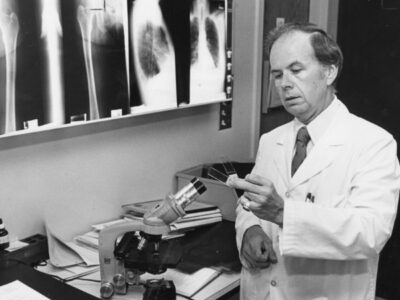On March 7, join Stacy Wentworth, Mirelle Luecke, and Karen Tumulty, in a free virtual panel discussion about Betty Ford and Nancy Reagan—two First Ladies who made history when they were diagnosed with breast cancer while in the White House.
The following is an excerpt from How We Do Harm: A Doctor Breaks Ranks About Being Sick in America, by Otis W. Brawley, MD, with Paul Goldberg, published in 2012.
On May 25, 2020, George Floyd said “I can’t breathe” more than 20 times before he suffocated on a street in Minneapolis. On Jan. 7, 2023, Tyre Nichols repeatedly screamed, “Mom, mom, mom” as he was beaten to death on a street in Memphis.
Richard Silvera is working to build trust between doctors Bronx communities that have a heavy burden of anal cancer.
Nearly three years ago, Robert A. Winn and Otis Brawley provided their unforgettable personal perspectives on the murder of George Floyd by Minneapolis police.
The release of FDA’s draft guidance, “Optimizing the Dosage of Human Prescription Drugs and Biological Products for the Treatment of Oncologic Diseases,” has been greatly anticipated since June 2021, when FDA announced in its accelerated approval of the KRASG12C inhibitor sotorasib that it would require a randomized, controlled trial comparing the efficacy of the labeled dose (960 mg once daily) to a 75% lower dose (240 mg once daily) as a condition of full regulatory approval (The Cancer Letter, June 11, 2021; April 29, 2022).
Duke Cancer Institute is commemorating 50 years of gynecologic care and research.
When you hear the words “world famous scientist,” “devoted parent and husband,” “enthusiastic mentor,” and “committed friend,” who comes to mind? I, like many others across the world, think of Dr. C. David Allis. David, a prolific scientist, with over 400 publications and more than 100,000 citations, made many discoveries that have shaped our understanding about how genes are regulated and made a full circle bench-to-bedside impact.
In January, the Cancer History Project is focusing on the legacies of the people who comprise the field. A full archive of individuals whose contributions are preserved in the Cancer History Project is available here.
When Kay Dickersin was diagnosed with breast cancer in 1986, the support group available to her in Baltimore focused largely on how to get the makeup and wig to look right.















